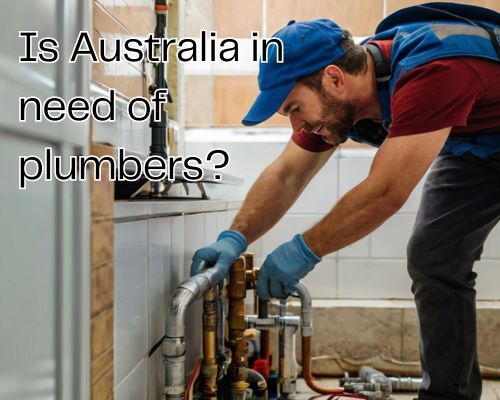Australia’s workforce is in flux, and nowhere is that more evident than in the skilled trades sector. With infrastructure projects booming, an aging workforce, and increasing demand for essential services, the plumbing industry is experiencing a critical shortage of qualified professionals. If you’re asking, “Is Australia in need of plumbers?”—especially in Victoria—the short answer is a resounding yes.

With Plumber Warragul, let’s explore the demand-supply gap in the plumbing trade across Australia, zooming in on Victoria, and discusses the implications for job seekers, policy makers, and everyday Australians.
🚿 Why Plumbing Is More Than Just Pipes
Before diving into workforce analytics, it’s worth acknowledging that plumbers are indispensable to public health, safety, and sustainability. From installing sanitary systems and gas lines to maintaining water infrastructure in homes and large commercial buildings, licensed plumbers ensure cities like Melbourne, Geelong, and Ballarat in Victoria function smoothly.
🔧 The Current State of the Plumbing Trade in Australia
Across the nation, the plumbing industry has been grappling with a chronic labour shortage. According to data from Jobs and Skills Australia (JSA), plumbers are consistently listed on the National Skills Needs List, and this is especially acute in urban and regional areas of Victoria.
📊 Industry Snapshot:
- Projected job growth: According to Labour Market Insights, employment for plumbers is expected to grow by 5.7% through 2026.
- Aging workforce: Over 35% of Australia’s current plumbing workforce is aged 45+, indicating a wave of retirements on the horizon.
- High demand regions: Victoria’s Mornington Peninsula, Greater Melbourne, and Gippsland regions have reported persistent shortages of qualified plumbers.
Conclusion: Yes, Australia is in need of plumbers—urgently.
🛠️ Why Victoria, in Particular, Is Facing a Plumbing Shortage
Victoria has become a hotspot for residential and commercial development. From new housing estates in Melton and Cranbourne to high-rise towers in Docklands and Southbank, the construction boom is fuelling the need for more tradies, especially plumbers.
🚧 Key Drivers:
- Infrastructure Projects: Massive investments such as the Suburban Rail Loop, North East Link, and Level Crossing Removal Project are increasing demand for commercial and industrial plumbing professionals.
- Regional Migration: The COVID-19 pandemic sparked a trend toward regional living, increasing development in areas like Bendigo, Shepparton, and Warrnambool, all of which now face trades shortages.
- Sustainability Push: Initiatives for green plumbing—rainwater harvesting, greywater reuse, solar hot water systems—have further increased the demand for plumbers with specialised knowledge.
👷♂️ What This Means for Job Seekers and Apprentices
For those considering entering the trade, the timing couldn’t be better. Becoming a plumber in Victoria offers a stable, lucrative, and future-proof career path.
💼 Entry-Level Outlook:
- Average hourly wage: Around $45 per hour for experienced plumbers, with apprentices starting around $20–25 per hour, depending on stage and agreement.
- Training requirements: Most start with a Certificate III in Plumbing followed by registration with the Victorian Building Authority (VBA).
- Pathways: Plumbing offers specialisations in gasfitting, drainage, roofing, sanitary, and mechanical services, each with their own licensing requirements.
📍 Local Tip:
In Victoria, TAFEs like Box Hill Institute, Chisholm, and Bendigo TAFE offer in-demand plumbing courses, with industry placements often leading directly to employment.
🧠 The Economic & Social Impact of the Plumber Shortage
When there aren’t enough plumbers, the consequences go far beyond leaky taps. Inadequate access to plumbing services can delay construction projects, inflate housing costs, and strain public health infrastructure.
🔍 LSI Keyword Integration:
- “shortage of tradespeople in Australia”
- “construction delays Victoria”
- “licensed plumbers Melbourne”
- “skilled labour gap”
Recent media reports in The Age and Herald Sun have featured stories of homeowners in Victoria waiting 6–8 weeks for plumbing appointments due to the demand outstripping supply—especially in the wake of flooding and storm events.
🔄 Government & Industry Response
To address the labour shortfall, both state and federal governments have rolled out initiatives:
- Skilled Migration Pathways: Plumbers are included on Australia’s Skilled Occupation List (SOL), enabling migration programs to fill gaps.
- Free TAFE in Victoria: As part of the state government’s skills agenda, plumbing is included in the Free TAFE for Priority Courses initiative, making it easier for locals to start a trade career without tuition fees.
- Incentives for Employers: The Boosting Apprenticeship Commencements (BAC) and Apprenticeship Support Australia programs provide financial support to encourage plumbing apprenticeships.
Visit Plumber Warragul for more.
🛑 Challenges That Still Remain
While initiatives are promising, obstacles persist, including:
- Length of apprenticeships (4 years on average)
- Licensing bottlenecks
- A lack of trainers and assessors
- Perception issues: Many young Australians still see trades as “second-tier” careers compared to university pathways
🚀 Final Thoughts: Is Now the Time to Enter Plumbing in Victoria?
Absolutely. The plumbing industry in Victoria, Australia, is ripe with opportunity, both in urban centres like Melbourne and regional areas such as Geelong, Mildura, and Traralgon.
Whether you’re a school leaver considering your future, a career changer looking for meaningful work, or a policymaker assessing workforce development strategies, the message is clear:
Australia is not just in need of plumbers—it’s depending on them.
🧩 Key Takeaways
- ✅ Yes, Australia—especially Victoria—is facing a plumber shortage
- 📈 Job growth is steady with high hourly wages and long-term stability
- 🏙️ Demand is particularly strong in Victoria’s urban growth corridors and regional centres
- 🎓 Free TAFE and apprenticeship incentives are making entry easier than ever
- 🛑 Bottlenecks still exist in licensing, training, and public perception
